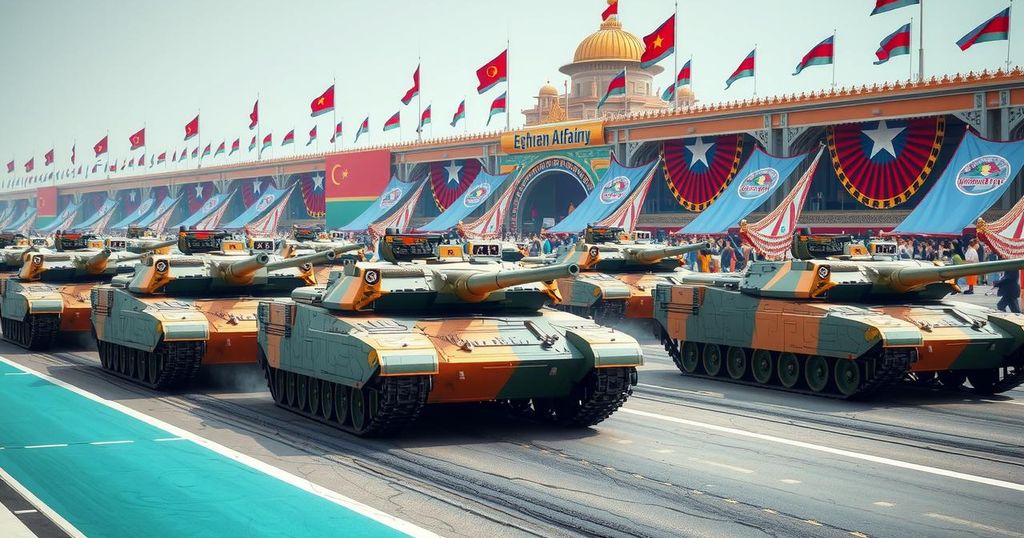Army’s 250th Birthday Celebrations Stir Concerns Over Political Neutrality
The US Army’s 250th birthday celebrations are raising concerns over the militaries’ apolitical stance, particularly with President Trump’s involvement. As the military parade approaches, officials worry about the risks of political entanglement and the implications for public trust. Past instances of partisanship have heightened these fears, and debates continue on how to uphold military neutrality in a changing political landscape.
As the US Army gears up for its monumental 250th birthday bash with a grand parade in Washington, DC, there’s a rising cloud of concern brewing. Former officials note a disturbing trend—such events might be dragging the Army into the murky waters of politics. The parade is not just about honouring the Army; it happens to fall on President Donald Trump’s birthday, which adds an unexpected layer of complexity to the proceedings. This comes during a time of heightened military presence in various US cities, with thousands of National Guardsmen mobilised in response to civil unrest, creating an even more tense atmosphere.
This parade will showcase an impressive array of military vehicles, showcasing several million pounds of military might. Yet, some veterans believe the optics are troubling. Footage from the event at Fort Bragg recently showed uniformed soldiers cheering Trump during a speech, reminiscent of the fervour seen on the campaign trail. Such displays have raised eyebrows, given the military’s longstanding apolitical tradition, as officials express unease about how the public interprets these events.
Inside military circles, there are talks of this being a PR blunder for the Army. Numerous regulations govern military involvement in politics, and some officials stress that the Army typically tries to steer clear of political entanglements. A defence official underlined that once Trump gets involved, the White House often takes charge, leaving military leaders little say. “It’s not the military that’s trying to be political; it’s people trying to use the military… for political gain,” stated one official, clearly concerned about the sense of control loss.
Opinions vary among military officials regarding the implications of such events. While some see the parade purely as a celebration of the Army’s legacy, others worry the public may link the occasion more closely with Trump’s administration. “We don’t know what the left and right limits even are, anymore,” lamented one current defence official about the uncertainty surrounding acceptable political behaviour.
The incidents don’t stop at Fort Bragg. Past situations—in which military personnel engaged in overtly political contexts—have emerged in recent years. This includes President Biden facing backlash for speaking with uniformed Marines behind him and other examples where military images were used in campaign materials. These instances underscore a growing concern among officials that blurring lines of partisanship could erode public trust in military credibility.
The Pentagon maintains strict guidelines against political activity for service members, aimed at ensuring active-duty personnel don’t engage in partisan politics or appear to endorse political candidates. Yet, the atmosphere at the recent Fort Bragg event has ignited a fierce debate. Soldiers were seen booing the media and cheering Trump’s remarks, provoking fears about the implications of such behaviours. Observers noted how soldiers, caught up in the moment, rallied around the celebratory atmosphere—a scenario some officials believe could lead to future detrimental effects on the military’s reputation.
Col. Mary Ricks, from the 18th Airborne Corps, defended the event’s intentions, calling it a collaboration with a nonpartisan group focused on the Army’s 250th anniversary. She emphasized that the Army is committed to its core values and its apolitical service to the nation. However, many officials voiced anxieties that such events ultimately undermine military trust—essential for recruitment and funding.
“Using the military backdrop as validation of a political agenda is where people really get upset,” remarked a former senior defense official. With Trump making a series of public appearances that intertwine military settings with political messaging, a recently retired officer noted a disturbing trend: a blatant disregard for the historically non-partisan relationship between civilian leadership and military personnel.
Concerns aren’t only about particular events; there seems to be a growing perception that such political displays may undermine the Army’s standing. One defence official posited that all branches should articulate clearer guidelines for maintaining order and discipline, but it appears that’s a discussion yet to be initiated—leaving many in the military feeling increasingly uneasy about where they stand.
The 250th anniversary of the US Army may have become a spectacle straddling the line between celebration and political endorsement, worrying some military officials. As events like the Trump speech occur, concerns rise that the military’s apolitical nature is at risk, which could damage public trust essential for recruitment. The ramifications of this politicization trend could be deeply felt, reshaping perceptions of military service in the future.
Original Source: www.cnn.com
